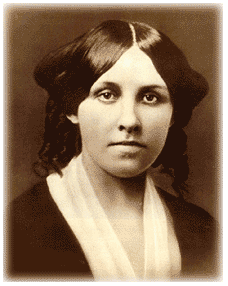Louisa May Alcott was a 19th-century American literary icon. She also was a nurse during the Civil War and was involved in the Women’s suffrage movement, becoming the first woman to register to vote in Concord, Massachusetts.
 Birth and Youth
Birth and Youth
Louisa May Alcott was born in Germantown, Pennsylvania, on November 29, 1832. She was the second daughter of Amos Bronson Alcott and Abigail "Abba" May. When Louisa was young, her family moved to Boston, Massachusetts. In 1840, the family moved to Concord, Massachusetts where Louisa and her sisters acted in plays she had written. In 1843, the Alcott family became part of an experimental communal village known as the Fruitlands. The project failed, so the Alcott family returned to Concord in 1845.
In 1849, Amos moved his family back to Boston; he was unable to provide a steady income for his family. Louisa wanted to help with her family's financial needs, and took on as many jobs as a young woman could find. Louisa and her sister, Anna, taught small children, and mended and washed laundry to help provide for the family.
Hints of Coming Fame
In 1852 Louisa's first poem, "Sunlight," was published under a pseudonym, Flora Fairfield, in "Peterson's Magazine." The payment was modest, but it was the beginning of a career that would bring her great notoriety and end her family's financial worries.
In 1855, her first book, Flower Fables, was published. Louisa’s family moved to Walpole, New Hampshire, but she remained in Boston to further her career. A year later, Louisa’s sister, Lizzie, contracted scarlet fever. Lizzie recovered for the time being, but her illness forced the family back to Concord, where the Orchard House was purchased for the family. Lizzie's sickness returned, and she died in March 1857. Anna, the eldest sister, announced that she was getting married. Lizzie's death and Anna's wedding plans compelled Louisa to return to Concord that year. She wanted to comfort her mother, who had lost one daughter to death and would lose another to marriage.
War Service and Poisoning
In 1862, Louisa May Alcott headed for Washington, D.C. to serve as a war nurse. She contracted typhoid fever, and although she recovered from it, she would suffer the effects of mercury poisoning* for the remainder of her life. While Alcott was in Washington, she was inspired to write Hospital Sketches, which published in 1863, followed by Moods in 1864.
Thomas Niles, Alcott’s publisher, told her that he wanted "a girl’s story." Alcott wrote furiously for two and a half months, and produced Little Women, based upon her experiences of growing up with three sisters. The novel was published on September 30, 1868. It was an instant success and sold more than 2,000 copies immediately following its release. It was such a big success that Alcott's publisher begged her for a second volume. In April 1869 came the release of Good Wives, the second half of Little Women. It immediately sold more than 13,000 copies. Alcott's tale of Meg, Jo, Beth, and Amy launched her into literary stardom and helped to alleviate the family's financial problems. Alcott followed up her success in 1870 with Old Fashioned Girl.
Literary Fame and Women's Rights
Louisa May Alcott's career flourished as she wrote book after book. Little Men was published in 1871, followed by Work in 1873, Eight Cousins in 1874, and Rose in Bloom in 1876. During that time, she became active in the women's suffrage movement, writing for "The Woman's Journal," and encouraging women to register to vote.
Alcott's mother’s health failed, and she died in November 1877. Her sister, May, announced her marriage to a wealthy European in 1878. May had a daughter the following year, Louisa May Nieriker. May succumbed to birth complications; her dying wish was for Louisa to care for her namesake, nicknamed Lulu. In 1880 Lulu moved to Boston to be with Louisa and helped to bring joy and fulfillment to her life.
Alcott moved the remainder of her family to a posh neighborhood in Boston, in 1885. She continued to write; however, the mercury poisoning she suffered during the Civil War had taken its toll. She published her last book, Jo's Boys, in 1886.
Her father's health failed, and he died March 4, 1888.
Two days later, at the age of 56, Louisa May Alcott died in Boston. Alcott wrote many memorable books during her lifetime. She left a legacy of literature for future generations to cherish.